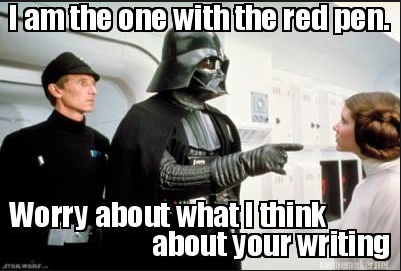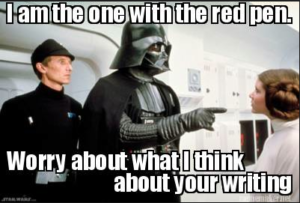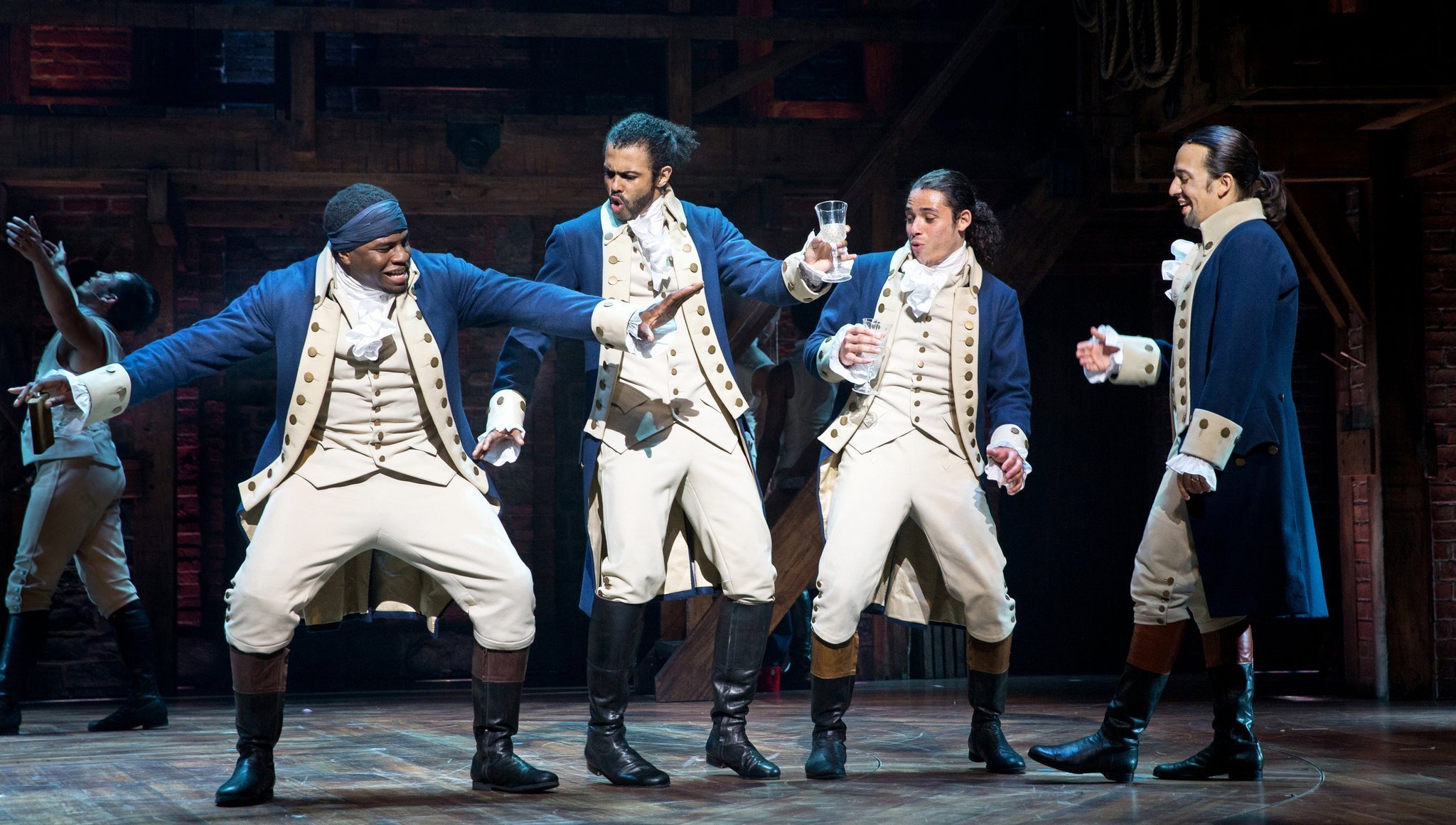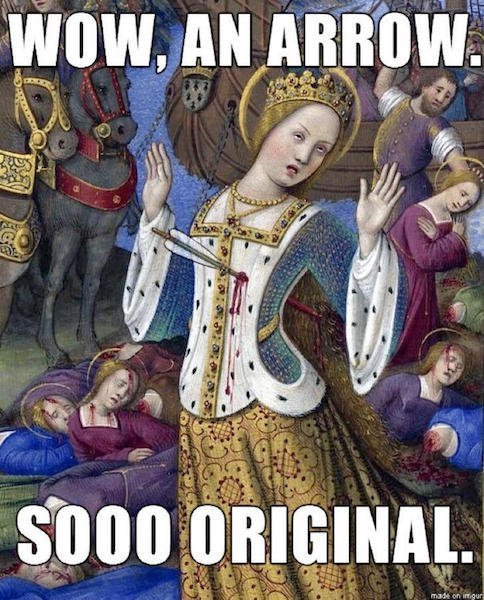
Not in a Galaxy Far Far Away
I get worried about leading the people we’re helping towards the answers and styles we think constitute “good” writing. Just coming from my own experiences there’s always a point in a class where I discover if I’m going to be able to say what I think without restraint, or if there is a way of thinking I’m going to have to emulate to get a better grade. I don’t think anyone would disagree with me when I say that we should approach this situation with the intention to empower our students own ways of thinking and their own approaches to articulation through writing, but as Wiley points out:
“…teachers who want to create classroom environments where students openly discuss their interpretations in order to grow and see and appreciate differences and recognize that interpretations grow and develop have great difficulty escaping familiar pedagogical routines. These are the routines in which teachers lead students to find the “best interpretations,” have students retrace the plot, look for the “author’s message,” and use class time to fill in what the students “didn’t get.” These are the practices where the students make all the important decisions, and students simply find material to satisfy what they eventually realize is “what the teacher wants” (Wiley 65).
So it seems that sometimes, even if we are cognizant of the dangers that lie in normalizing acts of “appeasing the teacher” that can occur within the context of a single class, and even if we actively try and create an environment conducive to exploration and free-thought the role of Teacher and Student, and the dynamic that lies between is one that comes with some cultural-baggage that’s hard for a class to unpack and overcome in the course of a single semester.
You can’t change an individual’s perspective in a semester if they’re not receptive to change, and you certainly can’t do it in a two hour session at the ESL center. I’m loving ESL, but I had an experience with a tutee where I felt like me and the lead tutor where leading him to the ‘more polished versions of his sentences we thought worked better.” We worked line by line, tried to pick up the rules of his “ballgame” by cross-referencing what he wrote with the assignment sheet, and I think we did send him out the door with a number of changes to make that will ended up getting him a much better grade (the real object of his activity in this case).
What bothered me is that when looking at each sentence we’d ask him things like, “What are you trying to do here?,” and “Can you maybe explain the concept to me in your own words?” The tutee always helped, but his answers were often brief, and he passed the ball back to us as often as he could. So we were asking questions to try and center the activity around probing his own thoughts and getting him to work with the writing and the prompt, but often in correcting and explaining little tense errors and adding or changing articles we’d suggest other changes in his sentences, places to break up big chunks of writing in to smaller paragraphs, and in doing so I really feel like we were leading him down our way of thinking and not necessarily helping to develop his own.
Now I think there’s some validity in thinking that he’s getting exposure to the ways in which ESL tutors think about and approach writing, and that is probably good because then he can evaluate whether the strategies we used are ones he could attempt when facing a similar task in the future (that would be something like transference). But I doubt he came into the situation with an awareness of what he had the chance to observe (how someone else thinks about writing), and I doubt he’ll be doing any reflecting on the whole experience outside of following the notes we gave him, making the changes, and turning in the paper.
There was something less than ideal about the whole exchange, at least this one time, and I was left feeling a little blue after the fact. Even knowing our tutee was about to get a much better grade I still felt a little down because I worry that it’s something he can’t yet begin to do on his own, and in this case we functioned on some level as enablers, doing the thinking for him when we should have been better at throwing questions back at him until the only thing on the page were his own thoughts and ideas. This feeling and that quote up above is something I’m going to try and keep track of going into the next session, but I think part of the lesson here is that there are real limitations that we are going to run into; the stated objectives of the class vs. what we hope we will be able to do, student receptiveness vs. our own patience in regards to managing our own hopes and the objectives we have to meet in terms of the class, and probably so many others.
I often feel like there are Ideals and then there’s the Reality, and if you can shoot for somewhere in-between those two points you manage the pursuit of ideals responsibly without them taking on the quality of self-destructiveness. Our Ideals are screaming to us that the development of thought, the ability to articulate them in a way that others can understand, and developing the personal agency to know that your thoughts have worth in the world and should be regarded at least as much as the next person’s are all ideals we hope to shoot for. And the reality as it’s defined currently is that as teachers we will be expected to meet certain objectives in the classroom, and it is by these objectives our effectiveness will be measured, and as the Wiley article points out; if these objectives are linked to formulaic writing, we could be doing more harm than good if we don’t take the time to unpack the objects of our writing and help show our students how these exercises might transfer outside of the FYC class (or the ESL center). But then there’s the finite time we have in class or in a session, and a moderate employment of ideals might not be enough to reach someone who isn’t receptive to the idea of trusting their own thought process just yet. leaves me with a feeling like, “I can show you the door, but you’re the only one who can walk through it.” And somehow that doesn’t feel good enough, you know?
Anyway, that’s all the boring and brooding stuffs.
I really am having fun in this class, and I’m glad that there’s a whole group of future teachers (maybe) who are looking at what a role as an English teacher might look like, and what are some of the dangers connected to playing an authoritative role in the life of a learner of English (regardless of whether they are a primary or second language learner). It is truly heartening. Even if we don’t yet have all the answers, we seem to be looking for them, and this is a great conversation to be a part of.
I’ve been thinking about what writing might sound like if he or she were personified. We said we wanted to have fun with this, and I thought I’d try and write a thing for this class. So I personified writing, made it a man, and took the approach of Writing reflecting upon itself in a FYC course. He use to be about expression and changing the world you know, and now he seems to be about confining people into more acceptable and more manageable modes of thought, and I think that’d be young Writing would have a hard time recognizing. It became a rap about personifying writing. I think I missed the mark a little, so there’s more work to be done when I go back in there and put the character in the bars, but this is where it’s at right now.
So:



